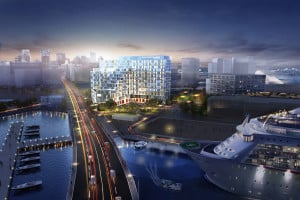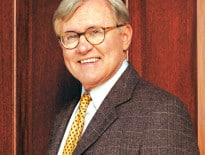More than 3,000 hotel rooms are under construction in the city of Boston, a sign of robust demand from the tourist crowd and business travelers alike.
Growth of direct overseas flights and corporate expansion in the Seaport has laid the groundwork for the hospitality boom, including Omni Hotels & and Resorts’ 1,055-room hotel, which broke ground last week at 440 Summer St.
Located across from the Boston Convention and Exhibition Center and just blocks from a growing roster of global headquarters, the $550 million project was viewed as a virtual slam-dunk by investors. In less than four months, developers obtained $330 million in construction financing from an eight-lender syndicate led by U.S. Bank.
“This project was very well-received in the market given the location, Boston being a top five hotel market, and the quality of the sponsor,” said Kevin Davis, managing director at JLL, which worked with the developers assembling the financing package.
Boston’s hotel market has strong fundamentals because it caters to a mix of tourists, business travelers and meeting business, said Mark VanStekelenburg, managing director for CBRE hotels. The variety of demand generators smooths out big fluctuations in occupancy rates.
“The slew of (hotel) development seems to be going across all asset classes,” he said. “We think it’s a good sign that development is going on to support each of those three segments.”
Occupancy rates in Boston and Cambridge hit 73.3 percent in the first quarter, up 3.4 percent from the previous year. Revenues per available room, a key indicator of hotels’ financial performance, rose 2.9 percent to $141.63.
CBRE Hotels is tracking 66 hotel projects in the planning stages in Greater Boston totaling 11,500 rooms. There’s no assurance how many will be able to secure financing, and the results will hinge upon the length of the economic cycle, VanStekelenburg said.
This year’s pace of development, at roughly 4 percent annual room growth, is roughly double the region’s average growth over the last 25 years, he said. But Boston still trails many large U.S. metros in room growth since the recession, a reflection of its high land and labor costs and shortage of easily-developable sites.
“Supply comes into this market at a measured pace,” said David McElroy, a senior vice president and hotel investment sales broker for CBRE in Boston. “The biggest bane of hotel investors is big bursts in supply. That generally does not happen in Boston.”
Investment sales activity has been relatively sluggish in the past two years, McElroy said. Many properties have already traded hands once in this economic cycle.
“Everyone’s afraid to buy at the top of the market, but nobody knows where the market is,” he said. “People guess and they’re wrong all the time, but it’s definitely hard to know where we are in the macroeconomic cycle.”
Hotel Growth Prompts Convention Center Study
Another factor warding off a looming glut of hotel rooms is the potential growth of Boston’s convention business, said Jenna Finkelstein, a senior consultant for CBRE Hotels.
The Massachusetts Convention Center Authority this spring selected Populous Architects of Kansas City to study expansion of the 70-acre BCEC campus, after citing research that new hotel construction in the Seaport could generate more meeting business.
The Omni hotel and recent groundbreaking of a 411-room Hampton Inn and Homewood Suites at 660 Summer St. are expected to make the Boston convention center more attractive to meeting planners, who prefer to book trade shows within walking distance of big hotel blocks.
“We’ve seen markets where 1,000-room convention hotels opened and the next year, occupancy (rates) increased even as more rooms were introduced into the market,” Finkelstein said. “Markets have been able to absorb this size of development before, especially when it represents a convention center expansion.”







